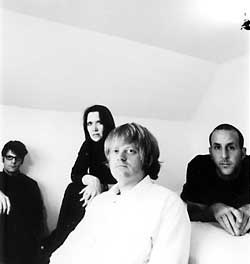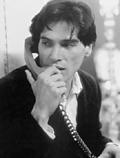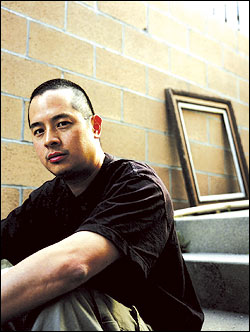Though they prefer to label themselves an instrumental rock band, Seattle quartet Kinski are key players in global psychedelic music. By itself, their music—alternately spacey, roaring, and simmering, led by sandstorm guitars—makes them one of America’s leading psych exponents. Initially a trio of Chris Martin, Lucy Atkinson, and Dave Weeks (the lineup that made the group’s 1999 debut, SpaceLaunch for Frenchie), they added Matthew Reid-Schwartz a year later and have since recorded two more albums, 2001’s Be Gentle With the Warm Turtle (Pacifico) and 2003’s Airs Above Your Station (Sub Pop), the latter with Weeks’ replacement, Barrett Wilke, on drums. Kinski have also been a conduit for the global psych scene to infiltrate the American West Coast, setting up and/or playing shows with Japan’s Acid Mothers Temple and Sweden’s Trad, Gras Och Stenar. They also recently opened for post-punk legends Mission of Burma on that band’s reunion tour. The Jukebox took place at Seattle Weekly’s offices.
Chris Knox: “Citric Acid” (1988) from Meat (Communion)
Chris Martin: It’s not Belle & Sebastian?
Seattle Weekly: No. Wrong side of the world.
Martin: It’s a ’60s thing?
SW: It’s a late-’80s thing.
Lucy Atkinson: [laughs] We’re way off.
Martin: It sounds like something that could be on KEXP right now.
SW: It definitely does. It’s not English—it’s from an English-speaking nation, but it’s not a Western nation.
Martin: Tall Dwarfs? Chris Knox?
SW: Yes, Chris Knox. A friend suggested I play you something from New Zealand.
Martin: I have a couple of their things, but most of the New Zealand stuff I have is the straighter, poppy stuff like the Clean or the Chills. This is a little quirkier.
SW: What was your introduction to that particular kind of stuff?
Atkinson: Working at the radio station in Bozeman, Mont.
SW: That’s where you went to school?
Atkinson: Yeah. I was from Montana and went to school in Bozeman, and I met Chris at school, at the radio station.
Martin: The first thing I remember was the Chills. I remember hearing that on somebody’s radio show, and it was kinda one of those times where, like, everything kinda stopped and I said, “What is this?” It was in the late ’80s. So it was kind of right when all the stuff was coming out early and a little after, I guess.
SW: What kind of shows were you doing?
Atkinson: Well, Chris was more experienced then—he was the music director. I just had a radio show at 2 or 3 in the morning.
SW: What kind of stuff were you playing?
Atkinson: At that time, I was playing a lot of ’60s girl-group kinds of things, girl groups and the Kinks.
Martin: You’d play a lot of Redd Kross and stuff like that, too.
Atkinson: Oh yeah, of course.
Martin: I just found out I got a little show on that station, KBCS, so I’ll be starting over again on the graveyard [shift].
SW: What kind of stuff are you planning on playing?
Martin: I kind of want it to be more free-form—’60s and ’70s psychedelic and Japanese stuff, and mix in some psych-folk stuff. I think there are a few shows like that in town, but not many.
Acid Mothers Temple and the Melting Paraiso U.F.O.: “L ‘Ambition dans le Miroir” (2004) from Mantra of Love (Alien8)
Martin: [immediately] Acid Mothers. [laughs]
SW: Now you obviously worked with those guys before—how was that arranged?
Martin: That’s the best thing about the Internet: We saw a newsgroup, and somebody posted who’d just gotten that Mainliner record, Mellow Out, and somebody asked, “Do any bands want to tour with Mainliner?” We had just started, we didn’t even have the first record out, but we said, “Yeah, we will,” just for fun. Makoto Kawabata, from Acid Mothers, was in that group, and we just all hit it off.
SW: You guys started around ’97 or ’98 or so?
Atkinson: It was ’99.
Martin: That’s when our first record actually came out.
SW: What are the Acid Mothers like to tour with?
Martin: They’re pretty normal. They’re pretty straightforward people; they just wanna play. When we get to the club, they’re sitting around from 5 to 7, and they all like to drink, but nothing overboard.
Atkinson: They’re not quite easy to talk to—Kawabata is, but the rest of them aren’t. I think that’s mostly because they don’t know a lot of English.
Martin: Most all the bands we toured with, like Hovercraft and Major Stars, those bands are considered out, I guess. I can’t think of any stories of people taking drugs or whatever; everybody’s pretty straight. I mean, we all have to get up and drive the next day.
SW: There’s a real work ethic involved in indie rock in order to make any kind of living at it.
Martin: Mark E. Smith was pretty fucked up. We played with the Fall once, and we didn’t expect him to be nice, but Matthew, our guitar player, was a really big fan, and [Smith] was kind of a prick to him.
SW: Was this around the time [Smith] got arrested in New York for beating up his keyboard player?
Martin: It was after that.
SW: He hadn’t really mellowed out . . . ?
Martin: You didn’t expect him to be nice, but . . .
Atkinson: They were borrowing some of our equipment to play. You’d expect he could at least say thanks.
Mudhoney: “Touch Me I’m Sick” (1988) from March to Fuzz (Sub Pop)
Martin: This one’s obvious.
SW: Did you move to Seattle around the time this came out?
Martin: I was here right before it really exploded. When I graduated from Bozeman, I was trying to decide where I wanted to go, Seattle or Minneapolis.
Atkinson: Part of it was that the music scene was vibrant.
Martin: There wasn’t too much to have heard of at the time—Mother Love Bone and Green River, [early] Sub Pop stuff.
SW: When you got here, did you think it was a mistake in coming here to play music?
Atkinson: I remember you talking like that at the time. . . .
Martin: Yeah, I mean, there was just literally thousands of bands moving in here, and moving here rather than just existing here. There were a lot of bad bands at that time, just bands trying to sound like Pearl Jam or whatever. It was kind of a weird time. The vibe was just not my thing, but it’s way better now, there’s just so much more diversity.
Mission of Burma: “That’s When I Reach for My Revolver” (1981) from Signals, Calls and Marches (Rykodisc)
Martin: [immediately] Mission of Burma.
Atkinson: We just heard them play this every night for a month.
SW: Exactly. How did you guys end up doing that?
Martin: I have no idea. We asked them, too, and I think [Clint Conley] the bass player said, “Yeah, I heard you guys’ records,” but he didn’t know, either.
Atkinson: It might have just been a booking agent thing, but I also know that Mission of Burma has this guy who’s a superfan who has seen every one of their shows ever, who comes out here and travels with them and everything. He saw us at Terrastock and really, really liked us, so maybe he had something to do with it.
Martin: [Burma] were really good guys, super professional. I was surprised after playing for basically 22 years that they’d be doing, like, two-and-a-half-hour sets.
Atkinson: They played really like young guys. They jumped around, with tons of energy.
SW: They never quit playing, but they quit playing as a unit. I wonder if that had anything to do with it.
Martin: When we got back home, there were two live Maine lobsters on the doorsteps [from the band].
Atkinson: It was a thank-you gift for being on the tour.
SW: Wow. How did people receive you on that tour? Obviously, people are there for Burma. . . .
Martin: Yeah, I was a little nervous about that.
Atkinson: Their response was great.
Martin: I think their audience is a little older, and there were kids, but mostly it was older. We played a short set, too. That helped.
Sun Ra: “Song of the Sparer” (1968) from Outer Spaceways Incorporated (Black Lion)
Martin: [after two minutes] I want to say Pharoah Sanders or John Coltrane, but the piano sounds wrong. Monk? No, too much in the background. Are there horns? [horns enter]
SW: You won’t be surprised when I tell you who it is.
Martin: Oh, is it Sun Ra? The horns kind of gave it away—that’s [saxophonist] John Gilmore.
SW: Yes. That sense of otherworldliness is why I’m playing this—to ask about how that sensibility works in Kinski.
Martin: The goal is to always make it seem like there is some sort of journey, I mean, whether we’re always successful or not. But I think you hear so much stuff where you know exactly where it’s gonna go and what it’s gonna do. So I think maybe, I don’t know if “space” is the word, but . . .
Atkinson: . . . It’s about taking you somewhere.
Martin: Yeah. Taking you somewhere, maybe somewhere you wouldn’t expect, or just a couple left turns. Or just putting you in a sense of space in your head, where you’re not . . . I think the ultra goal of any music is to take you away from reality a bit. You always comment on your reality after it’s done.
SW: When you started playing, was that something that you had talked about? Not in the sense of mapping it out beforehand, but especially playing live now, my guess is that having done it for a while, you can take it where you want to go. How much of that is instinct or how much of it is preplanned at this point?
Martin: The only thing that was preplanned [at the beginning], I think, was— because [on] our very first record that we put out ourselves, half the tracks had vocals, even though it was minor—as we kept going, we realized that the vocals kept really just rooting you in kind of a rock context.
Atkinson: The person who’s listening to the song, you really have to listen to what they’re saying . . .
Martin: . . . It just kept the music too grounded.
Atkinson: It’s not individualized to the listener as much, and we were enjoying that more. Did we ever sit and talk about it that way? Not specifically.
Martin: Vocals keep the band grounded, too, because somebody’s sort of having to memorize—I mean traditionally, memorizing these lines and then the music goes off—and you know, a lot of bands will have two or three minutes of the song and then they’ll take it somewhere else. We just sort of wanted [that part] to be alone, to take it somewhere else from the beginning, if that makes sense.
SW: Sure. Before you were a psychedelic band, were you interested in psychedelic music, or in psychedelics, period?
Martin: If we ever talk about our own band, we always just say we’re in a rock band. ‘Cause to say we’re a psychedelic band is really loaded. I just mean as far as critics, if they say something—in print, I just think that psychedelic rock looks better than space rock.
SW: OK, I gotcha.
Martin: I think we just think of ourselves as a rock band.
SW: I don’t mean now, I mean before, did that have any effect on you tweaking things to the left a bit?
Martin: No. Not really.
Atkinson: I’m not, ’cause I teach kindergarten.
SW: So do your students know that you play in a band?
Atkinson: Yes, they do.
SW: Have they ever asked to hear your music?
Atkinson: They want me to play, but they don’t really understand what it means to bring a bass rig into a school, so I just say no, I can’t. Last year we played at Bumbershoot, and there were some students there [with] their parents. That was pretty cool. We don’t play a lot of all-ages shows, so we don’t really have the opportunity.
Faust: “Krautrock” (1973) from Faust IV (Virgin)
Martin: This is one of my favorites.
Atkinson: This is one of the first Krautrock records we got, wasn’t it?
Martin: Yeah. I kinda read about the reissues. I got the CD for 99 cents in a Wherehouse store—they didn’t know what it was. I got it home and it just blew me away.
SW: The cover makes it look like a modern-classical record.
Martin: Yeah—I wish I would’ve heard this record when I was 12. I mean, things would have changed drastically.
Atkinson: Were all of those things available pretty much in the U.S. back then? I was talking to this Swedish band, Trad, Gras Och Stenar, and they were saying that there wasn’t much trading of music going on between, like they couldn’t really find any records in the ’70s, and vice versa—everybody just toured and stayed in their own country, so was this concept here? Probably not.
Martin: I remember, it definitely went to the U.K. more. I think it kinda trickled over here. Some of the stuff, like Neu!, got their CD over here.
SW: So you had just heard it, finding it for 99 cents?
Martin: Yeah, I think I had one Can record, and I thought they were interesting. After that, I just went crazy and started to turn a lot of people onto it.
SW: How did you discover Trad, Gras?
Martin: Three of the four guys in this band Parson Sound, in, like, ’67, were in Trad, Gras. It sounds like it was recorded yesterday; it’s amazing how ahead of its time it was, they’re really droning and really heavy and lots of guitars—it’s incredible. And then after we heard that, we just [kept going further]. They turned into [International] Harvester and then Trad, Gras. We started buying all of that stuff. And then the way we met them is that they were just doing six days in the East Coast—and I just wrote them and said, hey, if you guys want to set up [shows in] San Francisco and Portland from Seattle, if you guys want to come around—and they did. That was a year ago.
Spiritualized: “Anyway That You Want Me” (1990) from The Complete Works Volume One (Arista)
Martin: [on the first note] Spacemen 3. No, Spectrum.
SW: Further along.
Martin: Spiritualized.
SW: There you go. You got that really immediately.
Martin: Yeah, there’s always a vibe with all of their stuff: melancholy, sort of dark, but melodic.
SW: Painkiller music.
Martin: Yeah. That was a big influence on us when we first started. I heard that stuff when it came out, and I liked it, but I just wasn’t ready for it. And then I just started to listen to it again, and I thought, “Wow, this is really great.”
SW: Did it help you kind of figure out the direction you wanted to go?
Martin: Yeah . . .
Atkinson: . . . It sorta did.
Martin: Especially the way they mix pop with superexperimental stuff.
Atkinson: It’s really moody.
Martin: It’s really hypnotic, because of the repetition.
SW: When you were younger, even before college, was that something that appealed to you in music?
Atkinson: No, I liked completely pop music.








